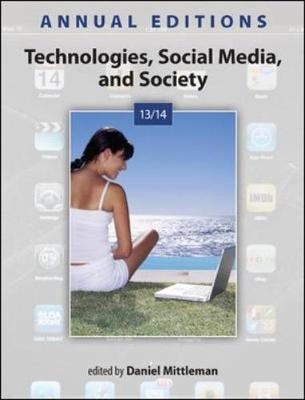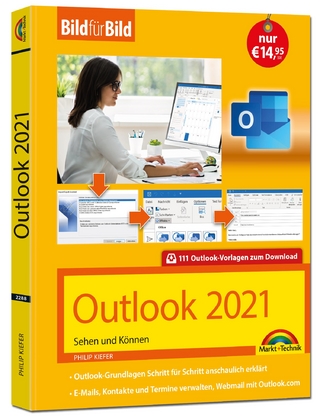
Annual Editions: Technologies, Social Media, and Society 13/14
McGraw-Hill Professional (Verlag)
978-0-07-352877-9 (ISBN)
- Titel ist leider vergriffen;
keine Neuauflage - Artikel merken
The Annual Editions series is designed to provide convenient, inexpensive access to a wide range of current articles from some of the most respected magazines, newspapers, and journals published today. Annual Editions are updated on a regular basis through a continuous monitoring of over 300 periodical sources. The articles selected are authored by prominent scholars, researchers, and commentators writing for a general audience. Annual Editions volumes have a number of organizational features designed to make them especially valuable for classroom use: a general introduction; an annotated table of contents; a topic guide; an annotated listing of supporting World Wide Web sites; Learning Outcomes and a brief overview at the beginning of each unit; and a Critical Thinking section at the end of each article. Each volume also offers an online Instructor's Resource Guide with testing materials. Using Annual Editions in the Classroom is a general guide that provides a number of interesting and functional ideas for using Annual Editions readers in the classroom. Visit www.mhhe.com/annualeditions for more details.
Daniel Mittleman is an Associate Professor in the College of Computing and Digital Media at DePaul University. He teaches coursework in Virtual Collaboration, Social Media, and Social Impact of Technology. Dr. Mittleman is the author of over 55 academic publications, and several dozen more conference and invited presentations. His research focuses on the design of virtual and physical spaces for work collaboration, as well as the design of collaborative work process. He has spoken on these topics at NASA, The World Bank, the Federal Reserve, NCSA, the Department of Defense, and multiple Fortune 500 corporations.
Annual Edition: Mittleman Technologies, Social Media, and Society, 13/14
Preface
Series
Correlation Guide
Topic Guide
Internet References
UNIT 1: IntroductionUnit Overview1. Five Things We Need to Know about Technological Change, Neil Postman, New Tech `98 Conference, March 27, 1998Postman suggests that computer technology is too important to be left entirely to the technologists. "Embedded in every technology," he says, "is a powerful idea. . . ."2. The Social Century: 100 Years of Talking, Watching, Reading and Writing in America, Derek Thompson, The Atlantic, July 26, 2012 (online)In 1912, communicating was simple; you talked, you wrote a letter, that was likely it. But by 2012, we have experienced a revolution in how we communicate. And this impacts how we do everything else.3. It's a Flat World, After All, Thomas L. Friedman, New York Times Magazine, April 3, 2005"Globalization has collapsed time and distance and raised the notion that someone anywhere on earth can do your job, more cheaply. Can Americans rise to the challenge of this leveled playing field?"UNIT 2: The EconomyUnit Overview4. How Google Dominates Us, James Gleick, The New York Review of Books, August 18, 2011"In barely a decade Google has made itself a global brand bigger than Coca-Cola or GE: it has created more wealth faster than any company in history." How has its corporate motto, "Don't be evil," fared in a company now awash in money?5. What Facebook Knows, Tom Simonite, Technology Review, July/August 2012"The company's social scientists are hunting for insights about human behavior. What they find could give Facebook new ways to cash in on our data—and remake our view of society."6. The Decision Lens, Helen Knight, New Scientist, April 14, 2012"Your phone and web browser are making choices for you, whether you want them to or not."7. Beyond Credit Cards: Q&A with Dan Schulman of American Express, Jessica Leber, Technology Review, March 7, 2012 (online)American Express built its brand around a plastic card. But what will the personal and business credit industry look like in a post-plastic economy?UNIT 3: Work and the WorkplaceUnit Overview8. My Life as a Telecommuting Robot, Rachel Emma Silverman, The Wall Street Journal, August 8, 2012"What would it be like to work from home, whilst also being in the office? Only one way to find out: Reporter joins forces with a "telepresence robot" to test limits of remote working. Yes there are problems, but it's not a washout."9. Automation on the Job, Brian Hayes, American Scientist, January/February 2009Not all that long ago, "nearly everyone agreed that people would be working less once computers and other kinds of automatic machinery became widespread." Instead those of us who are working are working more. Why?10. The Lost Steve Jobs Tapes, Brent Schlender, Fast Company, May 2012"A treasure trove of unearthed interviews, conducted by the writer who knew him best, reveals how Jobs's ultimate success at Apple can be traced directly to his so-called wilderness years."11. Women, Mathematics, and Computing, Paul De Palma, Encyclopedia of Gender and Information Technology, 2006Women remain underrepresented in the computer industry despite countless articles and proposals.UNIT 4: Social Media and ParticipationUnit Overview12. Small Change: Why the Revolution Will Not Be Tweeted, Malcolm Gladwell, The New Yorker, October 4, 2010"The Facebook page of the Save Darfur Coalition has 1,282,339 members, who have donated an average of nine cents apiece." Real change requires more than socialmedia, argues this well-known New Yorker writer.13. Relationships, Community, and Identity in the New Virtual Society, Arnold Brown, The Futurist, March/April, 2011"Facilitating and managing relationships online is projected to become close to a billion-dollar industry in the United States in 2011." Providing services to commercialized communities "will be a great growth industry."14. R U Friends 4 Real?, Amy Novotney, Monitor on Psychology, February 2012"Psychologists are learning more about how teen friendships are changed by social networking and text messaging."15. The YouTube Cure, Katie Moisse, Scientific American, February 2011"Popular demand for an unproved surgical treatment for multiple sclerosis shows the growing power of social media to shape medical practice—for good and ill."16. Everyone's a Player, Adam L. Penenberg, FastCompany, December 2010/January 2011"Games are sneaking into every part of our lives—at home, school, and work. Cisco, IBM, Microsoft, and even the Army depend on games. And pretty soon, you'll be a part of one. We guarantee it."UNIT 5: Privacy and SecurityUnit Overview17. Hacking the Lights Out, David M. Nicol, Scientific American, July 2011The recent Stuxnet virus, perhaps sabotage directed at Iran's machinery to enrich uranium, shows that industrial machines are vulnerable to attack. "Unfortunately," says the author, "the electrical power grid is easier to break into than any nuclear enrichment facility."18. Bride of Stuxnet, Jonathan V. Last, The Weekly Standard, June 11, 2012"Whoever engineered Flame didn't just build the most spectacular computer worm ever made. They created the perfect spy."19. Me and My Data: How Much Do the Internet Giants Really Know?, James Ball, The Guardian, April 22, 2012"James Ball discovered that the information Google and Facebook hold on him is disturbing but also comforting."20. The Web's New Gold Mine: Your Secrets, Julia Angwin, The Wall Street Journal, July 31/August 1, 2010"One of the fastest-growing businesses on the Internet, a Wall Street Journal investigation has found, is the business of spying on Internet users."21. The Conundrum of Visibility: Youth Safety and the Internet, Danah Boyd and Alice Marwick, Journal of Children & Media, 2009The authors contend that despite dangers associated with unrestricted access to the Internet, the real problem is that "the Internet uncovers many things that were previously hidden."UNIT 6: Public Policy and LawUnit Overview22. Know Your Rights!, Hanni Fakhoury, Electronic Frontier Foundation, June 27, 2011 (online) www.eff.org/wp/know-your-rights"Your computer, your phone, and your other digital devices hold vast amounts of personal information about you and your family. This is sensitive data that's worth protecting from prying eyes—including those of the government." These are your rights.23. The Yin and Yang of Copyright and Technology, Randal C. Picker, Communications of the ACM, vol. 55 no. 1"Examining the recurring conflicts between copyright and technology from piano rolls to domain-name filtering."24. The Online Copyright War: The Day the Internet Hit Back at Big Media, Dominic Rushe, The Guardian, April 18, 2012 (online)"As the demise of the SOPA anti-piracy act showed, established arguments for protecting the rights of content creators are almost impossible to apply to a digital world"25. Can Online Piracy Be Stopped by Laws?, Pamela Samuelson, Communications of the ACM, vol. 55 no. 7, July 2012"[Hollywood] glamorizes [pirates] who attack ships by depicting them as romantic heroes who have great adventures and engage in swashbuckling fun. Yet, it demonizes fans who download music and movies as pernicious evildoers who are, in its view, destroying this vital part of the U.S. economy." Hollywood pushed SOPA to criminalize digital piracy. Will it work? Who is the hero of this story?26. Aaron Swartz Hacks the Attention Economy, Antonio Regalado, Technology Review, February 10, 2012 (online)"A digital guerrilla fighter explains what's wrong with anti-piracy laws, why the Internet and copyright law don't get along, and how he got into politics."UNIT 7: International Issues and PerspectivesUnit Overview27. Internet Censorship Listed: How Does Each Country Compare?, Andrew Rininsl, The Guardian, April 16, 2012 (online)"Censorship of Internet content can take many forms and ranges from governments blocking the dissemination of political opinion to blackli
sting pornographic and pirate websites . . . Where is the internet the most open? Where is it the most restricted?"28. Watch Your Language! (In China, They Really Do), Mark McDonald, New York Times, March 13, 2012In China "Internet traffic is examined with a thoroughness and ruthlessness that is almost admirable in its scope. The term "Great Firewall" is appropriate and descriptive—and also banned by the censors."29. Global Trends to Watch: The Erosion of Privacy and Anonymity and the Need of Transparency of Government Access Requests, Katitza Rodriguez and Katarzyna Szymielewicz, Electronic Frontier Foundation, November 11, 2011 (online)"The erosion of privacy and anonymity and the need of transparency of government access requests." A report from workshop 160.UNIT 8: Projecting the FutureUnit Overview30. How to Spot the Future, Thomas Goetz, Wired Magazine, April 24, 2012"Seven rules . . . that underlie many of our contemporary innovations."31. Weighing Watson's Impact, Kirk L. Kroeker, Communications of the ACM, July 2011IBM's Watson recently defeated Jeopardy!'s two most successful contestants. Was this just (!) engineering or did Watson's triumph represent a leap forward in language understanding and machine learning?32. Augmented Reality Is Finally Getting Real, Kiji McCafferty, Technology Review, August 2, 2012 (online)"As smartphones explode in popularity, augmented reality is starting to move from novelty to utility."33. You Will Want Google Goggles, Farhad Manjoo, Technology Review, July/August 2012"I thought that glasses with `augmented reality' would be hopelessly dorky and could never go mainstream—until I saw the technology in action."34. Gene Machine, Matthew Herper, Forbes, January 2011"Jonathan Rothberg's desktop decoder could kick off a revolution in medicine, food, energy, even consumer products—and ignite the next $100 billion technology market."Test-Your-Knowledge Form
| Erscheint lt. Verlag | 16.6.2013 |
|---|---|
| Sprache | englisch |
| Gewicht | 315 g |
| Themenwelt | Informatik ► Office Programme ► Outlook |
| Sozialwissenschaften ► Kommunikation / Medien ► Medienwissenschaft | |
| Sozialwissenschaften ► Soziologie | |
| ISBN-10 | 0-07-352877-3 / 0073528773 |
| ISBN-13 | 978-0-07-352877-9 / 9780073528779 |
| Zustand | Neuware |
| Informationen gemäß Produktsicherheitsverordnung (GPSR) | |
| Haben Sie eine Frage zum Produkt? |
aus dem Bereich


